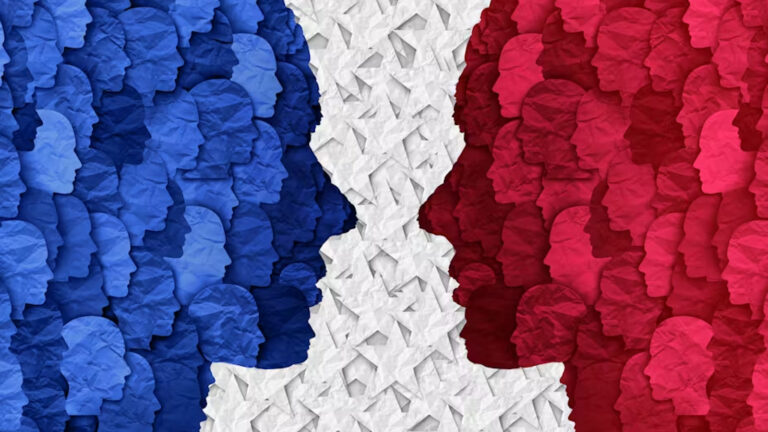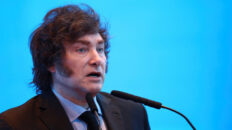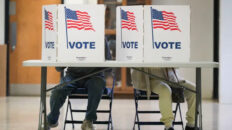Don’t dial the bughouse. I swear I’m not going crackers, coming unstitched, losing my grip or marbles or head, and my finely tuned senses aren’t taking leave of me. Just hear me out: sometimes, like John the Elder or Miss Cleo, I’m struck by glimpses of the future.
No, cherubim don’t blaze with heavenly fire before me, nor can I tell you if the cute receptionist at your office who greets you every morning with a chipper “hello!” is your soulmate. Nostradamus, I am not. And I’d probably misread mene, mene, tekel, upharisan as an açaí bowl topping. But premonitory signs sometimes catch my notice. The disparate yellowing of the oak tree leaves, burnt gold from the high August sun, in the park across the street from my house heralds autumn. And when I’m traveling to and fro between my hometown in Pennsylvania and adopted home of Server Valley, Virginia, (what AAA Road Atlas authors call Loudoun County), and am wending around Catoctin Mountain with its dips into long-running glens of verdant, unspoiled field grass, my eyes behold Blakean visions of multi-family-unit apartment buildings cropping up, springing pools of parking lots that circumference their bases.
If you’re among the self-loathing rump of the country paying attention to November’s election, you might also be witnessing our conventional political dynamic starting to subtly, quietly, almost imperceptibly, shift. Blabber of transposing paradigms, with Republicans courting organized labor’s favor, and Democrats making peace with profit-mongering, has been ongoing for years, with a surfeit of think pieces published and even full-fledged journals founded, to herald this new dispensation. Twitter philosophes bandy about terms like “the new right,” “national conservatism,” “democratic socialism,” “postliberalism,” and something, I think, called “brat liberal,” trying to put definition to what they view as the grand shuffling of the elephant and donkey into what they imagine is two nearly identical crossbreeds of a proboscidean pack mules mauling each other.
Coining neologisms and stamping labels on movements necessarily comes après-coup official establishment, when the college textbook cartel publishes consensus accounts within the glossy pages of history primers. We won’t officially know the reordering has happened until it’s settled opinion. As Garet Garrett liltingly described as the New Deal-ization of the American economy, “[t]here are those who still think they are holding the pass against a revolution that may be coming up the road. But they are gazing in the wrong direction. The revolution is behind them.”
What is the bubbling revolution that, even if it remains a moderate sizzling for the next few decades, threatens to invert our understanding? To quote an already over-quoted epigram: it’s economics, stupid!
Before this century’s out, assuming America is still standing and Uncle Sam isn’t a PlayStation-addicted Cheetos hog sunken six feet deep into a Chinese-assembled La-Z-Boy, and Lady Liberty hasn’t shaved the palisades off her crown and gotten top surgery, the parties will have switched in how they govern America’s humming engine of colossal consumption, otherwise known as the marketplace. Republicans will be the party of regulation and redistribution; Democrats will be the Randian handmaidens of Wall Street.
*Pasty, pustule-faced libertarian rises on his hairless, spindle-shanked haunches, screeching in dissent.*: “ACKTUALLY, the Washington uniparty already licks the loafers of the rich! Heh heh.”
Shoo! Outta here with you! *Smacks him down with all twelve-hundred single-lined pages of Rothbard’s Man, Economy, and State.*
To fill in my theory requires a smattering of facts. Since the Obama-era, Democrats have held a cash advantage during presidential elections, yanking in mounds of fresh lettuce from business titans, Hollywood, unions, and big banks. Republicans receive their fair share of dead presidents from a clutch of billionaires and high prole tradesmen, who share the high aspiration of shaving down marginal tax rates. The GOP’s unashamed bidding for the giga wealthy only bought so much goodwill and political donations; the party of Franklin Roosevelt and William Jennings Bryan has effectively co-opted the country’s elites, even while singing from the poor-and-downtrodden hymnal.
When the Democrats decided to cozy up to America’s plentiful pile of waiting dollars can’t be drilled down to a specific moment. There was Clinton’s neoliberal “triangulation”; Obama’s reluctance to prosecute banks for the ‘08 financial collapse; Madame Clinton’s asking if “we broke up the big banks tomorrow… would that end racism?; Biden’s family flagrantly padding their wallets off their surname.
Kamala Harris, the new-blue hopeful, is decidedly dropping the pretense of “Scranton Joe” populism in deed, but not in words. Her choice of Minnesota Governor Tim Walz as a running mate is a sop to working-class economics. But a Harris-Walz Administration is not a Farmer-Labor Party revival. As antitrust activist Matt Stoller has chronicled, Harris is doing what she does best: warming back up to the Silicon Valley overclass that helped make her career. Her campaign is courting megadonor Reid Hoffman, who, along with a conniving cabal of other tech overlords, is pushing for the ouster of Federal Trade Commission chair Lina Khan, a strident cleaver of corporate mergers.
Meanwhile, Republican vice-presidential candidate J.D. Vance praises Khan, declaring she’s “doing a pretty good job.” Vance also isn’t shying away from embracing the kind of industrial policy most of his party-peers would reflexively point to and call “socialism.” His support of minimum wage hikes, manufacturing sector impressums, labor boycotts, and the child tax credit show a heterodox philosophy butting into Republicans’ usual corporatism. Then there’s Trump’s ongoing love affair with tariffs, which, like Hamilton and Lincoln and Reagan, he’s convinced give American companies an edge over undercutting competitors.
Ideological movements don’t have through-lines to their actualization. Views change with fits and starts, questions and contemplation. Republicans aren’t an election away from becoming the progressive party; Democrats aren’t days away from forming reading groups over Friedman’s Capitalism and Freedom. Paul Kingsnorth writes that “‘politics’ is always a manifestation of what is happening in the depths.” And within the depths of our party system is restless movement, a churning of patterns, a retaining of old bits with an assimilation of new parts. Political parties aren’t constants—they’re as malleable as voter whim. A half century ago, Democrats were considered the illiberal party, as evidenced in John Updike’s Rabbit Redux when the well-meaning protagonist declares, “I’m a conservative. I voted for Hubert Humphrey.”
The new liberal party, when it becomes apparent to even the lay-est of observers, will finely blend woke identitarianism with unfettered consumeristic glee. As Matthew Walther contended, “woke capital is a tautology.” No limits on buying genders, nor selling wares. In contrast will be a pachyderm party that will return to its real conservative roots, abhorring change, whether it be épater le bourgeois exhibitionism or commercial startups threatening entrenched industry.
That’s America’s coming political clash, as my Delphic lenses descry it. Then again, I thought Hillary would win. So what can I really say for certain?














Add comment